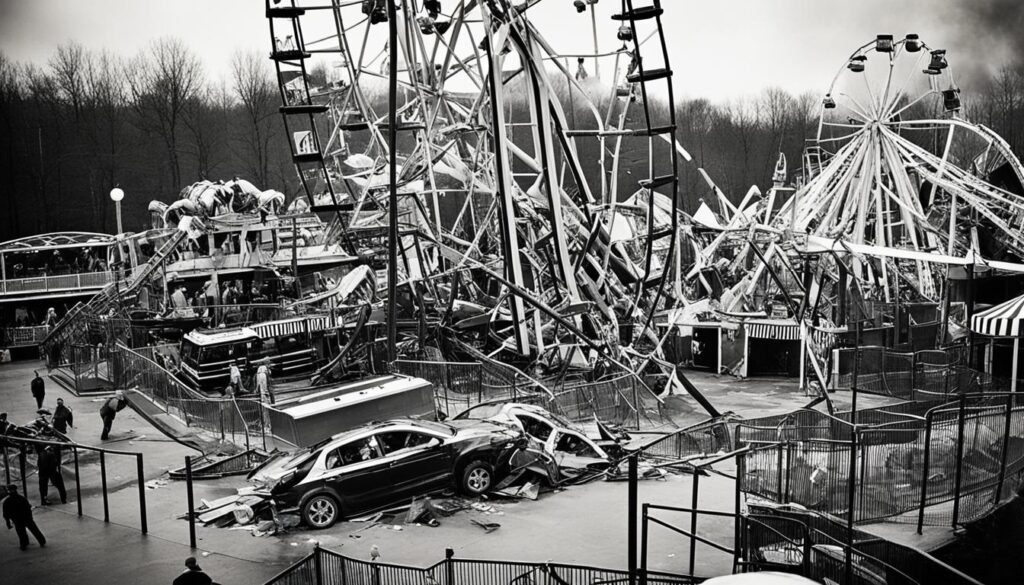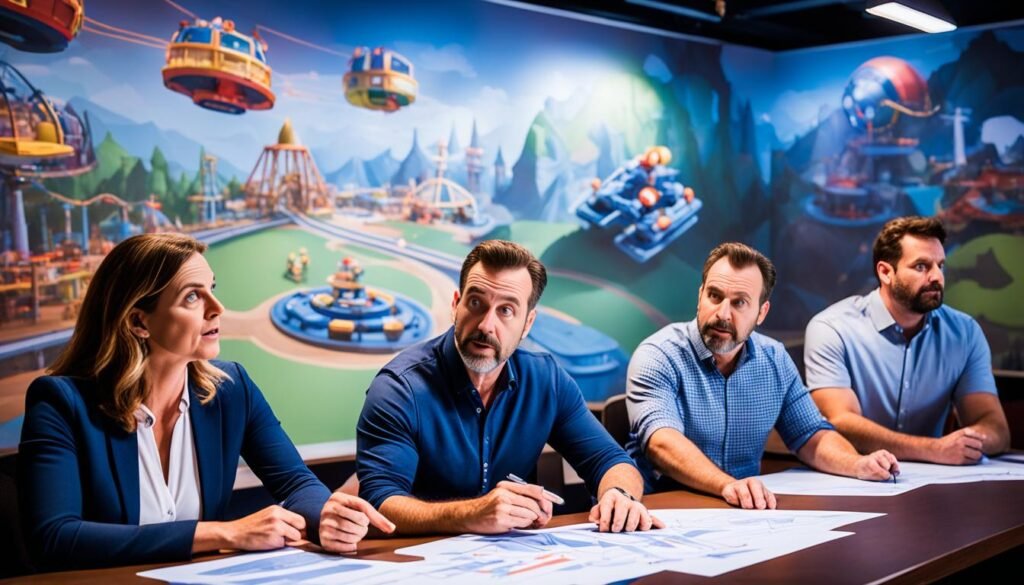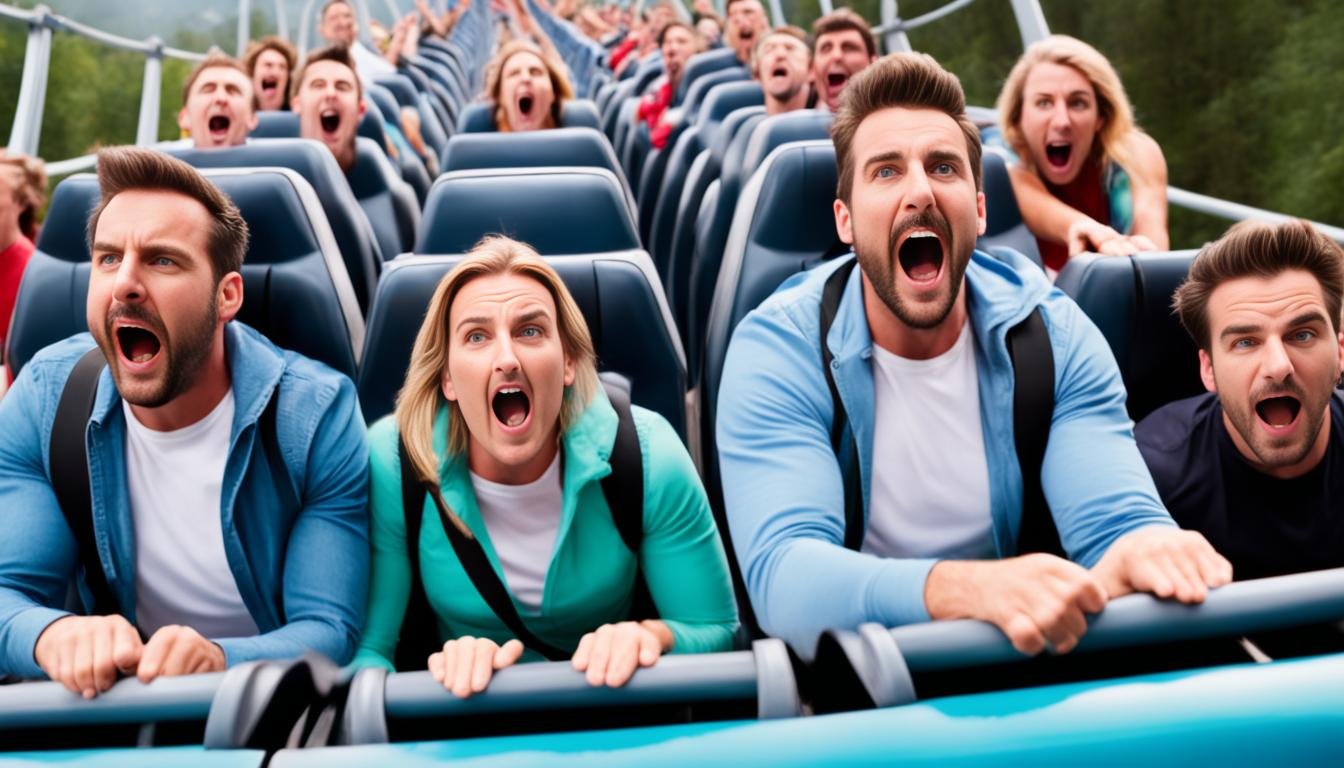Did you know that in the U.S. and Canada, around 1,224 ride-related injuries were reported recently? Amusement parks are places for fun and excitement. Yet, they also have risks. Knowing who is at fault in amusement park accidents is key. This knowledge helps protect your rights and get compensation for any injuries.
Key Takeaways:
- Amusement parks can be fun, but they also pose risks of accidents and injuries.
- Various types of claims can be made in case of amusement park accidents, including negligence claims, premises liability claims, and product liability claims.
- Parties potentially liable for amusement park injuries include amusement park owners, ride operators, and ride manufacturers or suppliers.
- It’s important to take precautions at amusement parks, such as following safety protocols and reporting any safety hazards.
- If you have been injured at an amusement park, seeking immediate medical attention and consulting with a personal injury attorney is recommended.
Types of Claims for Amusement Park Accidents
If you get hurt at an amusement park, several types of claims can be filed. These are aimed at making accountable those who are responsible. It’s key to know what claims you can make to effectively handle the legal steps.
Negligence Claims
If a park worker’s carelessness leads to an injury, you might file a negligence claim. This means the park didn’t take enough care, causing harm to guests. Negligence can include things like not keeping rides safe, not training staff well, or ignoring dangerous spots.
Premises Liability Claims
Premises liability claims apply if an unsafe condition in the park caused the injury. Guests should expect to be safe. If the park doesn’t ensure safety and you get injured, this claim is an option. Hazards like wet floors, broken fences, or poor lighting are examples.
Product Liability Claims
When a ride or equipment defect causes an injury, you can make a product liability claim. Rides and gear must meet high safety standards. If a flaw or failure harms you, the maker or supplier might be liable. Issues like ride breakdowns, faulty seatbelts, or structural problems are common triggers.
Remember, every claim has its rules and legal points. Talking to a lawyer skilled in amusement park accidents can guide you. They help figure out the best claim based on your situation.

Parties Potentially Liable for Amusement Park Injuries
Several parties could be responsible for amusement park injuries. This includes park owners, ride operators, and manufacturers. Even visitors can be held liable. Who is at fault often depends on issues like poor safety or not following rules.
Amusement park owners must keep their parks and rides safe. They need to make sure safety rules are followed. If they don’t and someone gets hurt, they could be to blame.
Ride operators are key to keeping visitors safe. They must run rides safely and make sure everyone is secured. If they don’t do their job right, they can be held responsible for injuries.
Ride makers and suppliers must ensure their rides are safe and work well. If a ride breaks down or has a fault that causes an injury, they might be liable.
While park owners, operators, and manufacturers are mainly responsible, visitors have responsibilities too. They should listen to safety instructions and behave properly. If a visitor’s actions lead to their injury, they could be partly to blame.
Knowing who could be liable for amusement park injuries is important for figuring out fault. Each case is different and needs careful investigation to find out who is at fault.

Precautions to Take at an Amusement Park
Amusement parks are full of thrill and fun. But safety should always come first. Follow these tips to keep your amusement park visit safe and delightful for everyone:
Dress Appropriately
Dress in comfortable clothes and shoes that won’t interfere with your movement. Steer clear of any loose outfits or dangly jewelry that might catch on the rides.
Stay Hydrated
Amusement parks require a lot of walking, especially when it’s hot. Make sure to drink water regularly. This will help you avoid dehydration and heat-related issues.
Take Breaks
It’s important to take short breaks now and then. Resting helps prevent tiredness. It also lowers the chances of getting in an accident because you’re too worn out.
Follow Safety Protocols
Listen carefully to the ride operators’ safety talks. Follow all their instructions. Always buckle up and secure loose items before the ride starts.
“Your safety is our top priority. Please ensure you follow all safety instructions and guidelines to have a memorable and safe experience at our park.” – Park Management
Report Safety Hazards
Seen something unsafe? Tell the park staff or management right away. This could prevent accidents and keep others safe.
Seek Immediate Medical Attention
Got hurt? Don’t wait to get help. Getting medical attention quickly is key. It makes sure you’re treated right away and documents your injury.
Report the Incident
Tell the park management about any accidents as soon as you can. This helps them figure out what went wrong. They can then work to stop it from happening again.
Gather Evidence
If something happens, try to collect any proof you can. Photos, statements from witnesses, and other info can be very useful, especially if you need to make a case.
Consult with an Attorney
If you think the park was at fault for your injury, talking to a lawyer could help. A personal injury lawyer can offer advice, evaluate your case, and explain your rights and options for seeking compensation.
By taking these steps and knowing your rights, you can have a safe and fun time at amusement parks. Always put safety first. This way, you can make great memories without any setbacks.
The Number of Amusement Park Accidents
Many people don’t know how common amusement park accidents are. A US Consumer Product Safety Commission report found about 10,580 emergency room injuries from these accidents in 2000. This shows why it’s important to know the risks of amusement parks.
Finding out who is at fault for these accidents can be hard. It requires looking at premises liability laws and the specific details of each accident. Figuring out who is responsible needs a deep look into the facts.
Amusement park accidents can include things like ride malfunctions and slips and falls. Every incident needs to be looked at closely to figure out who is liable.
“Accidents in amusement parks are more common than many people realize.”
Amusement Park Accident Statistics
It’s very important for both park operators and visitors to understand how often accidents happen. By looking at the stats, we can see the risks and why safety needs to be better.
| Year | Number of Emergency Room Injuries |
|---|---|
| 2000 | 10,580 |
| 2001 | 11,480 |
| 2002 | 10,980 |
| 2003 | 10,620 |
The stats show that amusement park accidents have been a steady problem. The number of injuries makes it clear that safety needs constant improvement for the sake of visitors.
Park operators need to take these numbers seriously and make safety a priority. Visitors should also know the risks and be careful when trying out park attractions.
Knowing the stats on amusement park accidents can help you stay safe. By being aware of the risks and taking care, you can enjoy the park’s fun without worry.
Premises Liability in Amusement Park Accidents
In amusement park accidents, the law focuses a lot on who owns the place. The owner must make sure everything in the park is safe. They have to keep rides in good shape, fix problems quickly, and remove any dangers. If someone gets hurt, they have to prove the owner knew it was dangerous and did nothing.
Visitors trust the park owner to keep them safe. A broken ride can be very dangerous. The owner must check the rides often, find any issues, and fix them right away. This helps prevent accidents and keeps everyone safe.
If an accident happens and the owner didn’t do their job, they might be blamed for being careless. Being careless means they didn’t follow safety rules or fix dangers. This is serious because it’s their job to keep the park safe for everyone.
Amusement Park Accidents: Proving Negligence
To win a case about an accident in an amusement park, it’s important to show the owner was careless. The person who got hurt must prove the owner knew there was a danger but didn’t fix it. Photos, stories from people who saw what happened, and experts’ opinions help prove the owner was at fault.
Getting help from a lawyer who knows about amusement park accidents can really help your case. A lawyer can guide you, collect proof, and make a strong argument for you to get paid for your injuries.
The person who got hurt has to prove their case in court. They need to show the owner knew about the danger and could have fixed it. This increases their chance of winning the case.
Negligence can also mean the owner is blamed for injuries because they didn’t properly train or watch their staff. If bad training or lack of supervision leads to an accident, both the owner and the employee can be held responsible.
Premises Liability in Amusement Park Accidents Breakdown
| Elements of Liability | Description |
|---|---|
| Owner’s Responsibility | The owner assumes the majority of liability for maintaining safe conditions in the park, including proper maintenance of rides and addressing mechanical failures promptly. |
| Proving Negligence | Injured parties in premises liability cases must demonstrate that the owner had knowledge of the hazardous conditions and failed to take appropriate action. |
| Employee Negligence | If it can be proven that the park operator failed to adequately train or supervise staff members, resulting in an accident, both the owner and the employee may be held liable. |
Understanding how the law applies to accidents in amusement parks is key if you’re hurt and want compensation. By knowing about the owner’s duty, how to show negligence, and the role of employee mistakes, you can stand up for your rights and seek fair treatment.
Duty of Care Applied to Amusement Park Rides and Other Aspects
Owners of amusement parks must make sure everyone is safe. This includes duty of care for rides and visitor health. They need to do many things to lower the chance of accidents. They focus on a few main things:
- Safety of Rides: It’s vital to have regular maintenance and checks. This helps find and fix any safety risks. They look for mechanical problems, check safety belts, and make sure everything is structurally sound.
- Clear Safety Instructions: Parks have to give clear safety instructions. This tells visitors how to use the rides safely. It’s important so guests know the risks and how to avoid them.
- Supervision of Employees: Having well-trained and alert staff is key. Park owners must watch over their workers. They need to ensure employees follow safety rules, help guests, and control crowds properly.
If a ride is unsafe because of bad design or defects, the park owner can be liable. That’s why it’s crucial to inspect everything, keep up on maintenance, and follow safety guidelines. Park owners also have to keep the park grounds safe and watch out for hidden dangers.
Safety is top priority for amusement parks. They need to have solid maintenance and check-ups. By doing this, they keep guests safe and avoid accidents.
Besides, employee negligence can lead to accidents too. If an employee doesn’t give good instructions or manage crowds well, it can be dangerous. So, park owners must make sure their staff is well-trained and focused on keeping visitors safe.
Conclusion
Amusement park accidents can cause injuries and make us worry about who is to blame. It’s key to know about the claims you can file, who might be at fault, and the laws that apply.
When you’re having fun at an amusement park, remember to keep safe. Follow the park’s rules, wear the right clothes, and drink plenty of water. If you get hurt, getting help right away is important to take care of your injuries and to record what happened.
If an amusement park’s carelessness led to your injury, getting advice from a lawyer is smart. They can help you understand your rights and how to get compensation. You can ask for payment for your injuries and costs, holding those at fault responsible.

